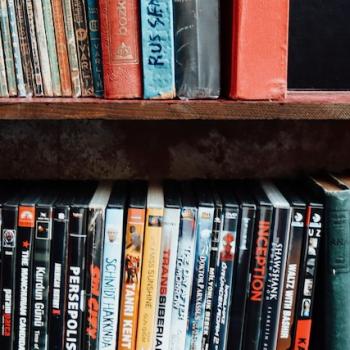1. What began your love for the medium of film, why is film important, and why did you began your career as a film critic?
Some of my most beloved memories are of me sitting with my family around the dinner table discussing the theology of movies that we watched together as a family. What they were saying, what they got right, what reflected the truths of Christianity, and what was wrong. My mom and dad were both ordained ministers and so they were major theology nerds and they loved discussing these things.
For me, films were always the purest gateway to imagination. I could enter into a vision for the world that someone had made and I could be swept up in it, wrestle with it, and even critique it. Books, comic books, paintings, poetry, etc, all require you to co-create with the author–even if it’s just the movement. Even video games require your participation. But movies allow us to create and receive a complete vision, in all its flaws, and engage with it with equal fullness of ourselves. I think that it’s important to have “complete” visions for us and for our culture to express and engage with, both individually and as a community, and films do that. That’s why so many societies did plays, and religious rituals as a community as their central cultural-binding works, because plays brought together the written word with images, with song, and human participation. There’s something about the completed work that brings us joy and is important to bind us together as a society.
I often read a book and feel like it’s a child waiting to grow up into a movie, which would be its final form. Often the highest compliment I can give a book is “I want to turn this into a movie”. Obviously, I know that’s not true. Books like The Murder of Roger Ackroyd are best as books and would be less, not more if they were turned into movies. But there’s a reason that people always say you should read the book before you see the movie. Because once you see the movie, you’ve seen a “complete” vision of the story, which means that in order to enjoy the book you have to “un-remember” a part of the story in order to re-insert your own imagination into it to “re-complete” it.
All that to say, there’s clearly something deeply powerful and important about the film medium for communicating and expressing the human imagination and human soul, which is why it’s so darn popular and compelling.
I started making YouTube videos in high school where I would analyze movies from a theological-philosophical-cultural lens. When I went to college people noticed that and I gained a reputation for being a big movie expert. So I started writing movie reviews for the school magazine and then started a blog Overthinking Films. I started having conversations with friends and professors who encouraged me to write for magazines they were connected to. I was talking to my friend Josiah Peterson who was connected to the magazine An Unexpected Journal about my thoughts about Christian films, and he encouraged me to write them down as an essay for the magazine, which I did. Then, during a conversation with one of my professors, Dr. Paul Glader, suggested that I write for the magazine he was helping to run Religion Unplugged. I took him up on that offer after college just before the pandemic started and became a regular reviewer after that, which expanded into writing for other magazines.
2. What does film have to do with faith?
Film is an avenue of communication that communicates with representational images and movement. The question always is: what is it communicating, both in the content of what it’s communicating and the method of communication? Think about it: how much of art, whether paintings, music, statutes, or plays, before the 20th century, have been used to explicitly worship God or express religious experiences and ideas? Handel’s Messiah? Dante’s Inferno? Because faith is so central to the human experience, images, and performances have always been used to communicate those things, whether that’s church buildings, icons of Jesus and the Saints, or the “Mystery Plays” of the medieval church. In fact, religious ceremonies–both for the ancient Greeks and then with church services in the medieval era, were where theater started in the West. They started celebrating and communicating faith at worship services and then expanded out from there to separate theaters where they started talking about other aspects of the human experience rather than specifically religious ones.
The tragedy is that, by the time the technology of film was invented, the engines of culture creation were primarily secular. So using film to explore the part of the human experience that is explicitly religious has been marginalized and underdeveloped, such that we think of a film that is “faith-based” as something that’s in a separate category. This is something that Barry Langford’s Film Genre book has talked about. We’ve spent decades creating a secular film language to explore ideas of good and evil, sex and stoicism, such that they are cliches now that can be subverted, like the “white hat vs black hat” in cowboy movies representing good and evil, or the “everything slows down when the protagonist is looking their crush while a pop song plays in the background” to represent being infatuated. But there is very little work done in exploring the depth and nuances of religious faith–let alone Christian faith. That’s one reason faith-based films can somehow come off as so preachy: they don’t have a visual language to represent faith so they have to just clumsily speak it.
3. What is your biggest frustration with the state of faith-based films and the Christian film industry?
Good question. My biggest frustration is that there seems to be a lot of resistance to growing up in how it expresses and communicates faith and Christianity. It highly limits itself to a very Hallmark movie channel-inspirational family drama way of expressing Christian faith and seems satisfied with that. There are two problems with that: First, even at its best, that is only a very small part of how faith is experienced and therefore only a small part of how it should be expressed. These movies tend to appeal primarily to Christian moms who want something they can watch with their kids. But it doesn’t appeal either to the kids or to the dads, let alone the young adult men or women who aren’t watching movies with their parents. There should be faith-based content for moms and their families, but also R-rated content, PG-13 content, edgy content, action, horror, comedy, arthouse, and everything in between. Because God is the god of all truth, He should be able to be expressed in and redeem every aspect of the human experience.
But secondly, it goes deeper than that. Even within the Christian Hallmark genre, there’s a certain level of dishonesty about Christianity that they don’t seem to want to grow out of. A lot of those films are built around people resisting God’s help or grace, but as soon as they do, they instantly have their flaws fixed. Or at the very least, the flaws are fixed off-screen or in montage. Jesus Revolution and Ordinary Angels are good examples of this. But that’s not what growing to become more Christlike is like, at least for most people in most circumstances. It’s more like a sports movie or an action movie, where the majority of your time is spent on the struggle to grow each day–God being our helper, obviously. But it takes a conscious wrestling with God and our sin in order to grow in that way, and faith-based films tend to either deny that or ignore that. This trains Christian audiences to see struggle in their walk as something to be uncomfortable with, or a sign that something is going wrong, rather than something glorious to pursue and a sign that you’re doing something right. Faith-based films romantacize the destination. Faith-based films need to start romanticizing the journey. That will make for healthier Christians. And also just better stories.
4. What is your greatest hope for faith-based films in the future?
My greatest hope is that faith-based films will start expanding the kinds of stories that we can tell about God and faith, and experimenting with the ways we can tell those stories to better invent film language to express it visually–not just preach it audibly. I am hopeful about this because I see more and more growth in this area, and more and more people expressing a desire to make and see more different types of films from the faith-based world, whether it’s last year’s Nefarious doing true “faith-based horror” or Exemplum‘s psychological thriller. Even the traditional faith-based films are getting better, with last year’s On a Wing and a Prayer being a true standout in the genre. There are also a lot more studios and streaming services coming out that are trying to do faith-based content, which means more opportunities for different styles and niches to develop. So yes, I think there’s a lot to hope for.
5. What is the best example of a film about faith that you’ve seen? Why?
That’s a tough question. There isn’t any one that represents what I wish for faith-based films or know that it’s capable of. The Passion of The Christ is probably still the best when it comes to imagining how to use film language to express the beauty of Christ and why He’s worthy of worship. Signs does an amazing job of using images and editing to show how the same circumstances can be looked at through the eyes of doubt and the eyes of faith, and how the eyes of faith help you see the world more clearly, and lead to restoration. Prince of Egypt shows the potential of faith-based films in animation. Believe Me shows its potential in satire. Father Stu was fascinating because the secular reviewers said it was compelling until Stu became a Christian, and the Christian reviewers said it didn’t become compelling until he became a Christian. But I found it compelling throughout. So that tells me they actually did a good job of showing both sides of the coin, but people who haven’t been on both sides of the coin don’t resonate with the other side of the coin.
All that said, there are movies out there. And I’m hopeful and prayerful that there will continue to be more and they will find an audience. Because the best part of life should be explored to the fullest in what is–in my humble opinion–the best artistic medium.
To discover more of Joseph’s work or contact him, visit: www.josephholmesstudios.com














